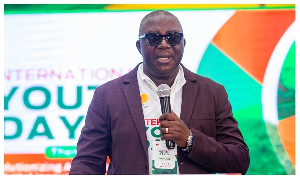 Daniel Fahene Acquay is the CEO of Agri-Impact
Daniel Fahene Acquay is the CEO of Agri-Impact
Agri-Impact CEO Daniel Fahene Acquaye has warned that Ghana’s annual post-harvest losses — valued at up to $2 billion — are so substantial that they could feed the entire Ashanti Region for more than a year, calling for urgent reforms and the establishment of an AgriFund to transform the sector.
Speaking at the first Regional Agribusiness Dialogue in Kumasi on Friday, 10 October 2025, Mr. Acquaye described the situation as both alarming and wasteful, urging investment in agribusiness infrastructure and policy reform.
“Our post-harvest losses per annum are estimated between $1.9 and $2 billion. I recently calculated that the value of food and non-alcoholic beverages consumed in the Ashanti Region alone is GH₵14 billion, about $1.2 billion, depending on the exchange rate you use. This means the food we lose every year could feed the entire Ashanti Region for more than one and a half years,” he said.
He cautioned that Ghana’s continued reliance on food imports despite such losses was unsustainable, noting that the country still spends nearly $2 billion annually on food imports.
Mr. Acquaye reiterated his long-standing call for the creation of an AgriFund — a dedicated financing mechanism to drive growth across the agricultural value chain and make agribusiness a cornerstone of Ghana’s economy.
“If we say agriculture will transform our economy, then why don’t we have an AgriFund?” he asked. “We must reset for transformative agri-investments.”
The Kumasi engagement marked the first in a series of regional consultations towards developing Ghana’s first National Agribusiness Policy, spearheaded by the Ministry of Trade, Agribusiness and Industry (MoTAI) in collaboration with Agri-Impact Limited, Mastercard Foundation, PwC, Development Bank Ghana, and other partners.
According to Kwame Ntim, Head of Agribusiness at MoTAI, the dialogues aim to gather stakeholder input for a coherent national policy framework that will align fragmented initiatives and drive sector-wide growth.
“The agribusiness sector has operated in a fragmented manner with no single policy guiding it. These consultations will help us develop a strategic framework for coordinated growth,” he explained.
A Partner at PwC Ghana, Hayfron Aboagye, also underscored the importance of collaboration, urging industry players to take ownership of the sector’s transformation.
“It’s baffling that with our vast arable land, we still consider ourselves poor. Agriculture and agribusiness present both a challenge and an opportunity — one that requires collective effort,” he said.
The regional engagements follow a National Agribusiness Dialogue held in July 2025, which was attended by President John Dramani Mahama and the Minister for Trade, Agribusiness and Industry, Elizabeth Ofosu-Adjare, marking Ghana’s renewed commitment to making agribusiness a driver of national prosperity.
